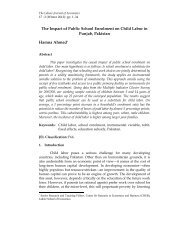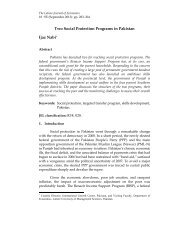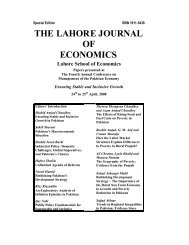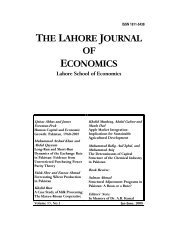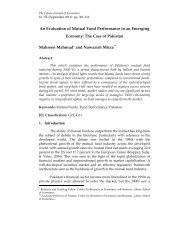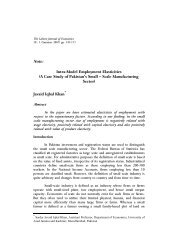Special Edition-07.pdf - Lahore School of Economics
Special Edition-07.pdf - Lahore School of Economics
Special Edition-07.pdf - Lahore School of Economics
Create successful ePaper yourself
Turn your PDF publications into a flip-book with our unique Google optimized e-Paper software.
Monetary and Fiscal Policies 55<br />
This flawed strategy cost the government and the tax payers dearly as the<br />
debt pr<strong>of</strong>ile became skewed in favor <strong>of</strong> short-term debt. The opportunity<br />
cost <strong>of</strong> this poor financial management has been massive – it could be as<br />
much as Rs.100 billion over the next 10 years. While the government<br />
would, and should, have raised more long-term relatively cheap debt, it took<br />
the bizarre decision to discontinue issuing bonds <strong>of</strong> longer term maturities<br />
and relied more on short-term bonds 18 .<br />
Moreover, there is also a need to distinguish between the structural<br />
and cyclical components <strong>of</strong> the deficit, a need to improve the cost<br />
effectiveness <strong>of</strong> government expenditures and to raise the tax to GDP ratio<br />
over time. Without a stipulation separating the structural from the cyclical<br />
components <strong>of</strong> a deficit, the present government would not have been able<br />
to undertake the kind <strong>of</strong> capital restructuring <strong>of</strong> KESC, WAPDA and PIA<br />
that have been, or will be, forced upon it, which, in the past pushed the<br />
fiscal deficit beyond the targeted level.<br />
Treasury bills and other government bonds held by the State Bank<br />
essentially serve the purposes <strong>of</strong> a monetary policy. This holding may<br />
increase or decrease based on open market operations conducted by the<br />
SBP 19 . Since one <strong>of</strong> the implicit aims <strong>of</strong> the proposed legislation is to<br />
grant greater independence to the SBP to conduct its monetary policy,<br />
then the SBP’s holdings <strong>of</strong> such government securities should be excluded<br />
from the purview <strong>of</strong> this legislation. This is because these bonds would<br />
not, in the true sense <strong>of</strong> the term, constitute a part <strong>of</strong> the government’s<br />
debt, since the SBP is in itself a part <strong>of</strong> the government and if a<br />
consolidated balance sheet were to be prepared, this debt would be<br />
cancelled as a contra item. This writer would, therefore, propose that, in<br />
keeping with the spirit <strong>of</strong> the Act, only that part <strong>of</strong> government debt held<br />
by households, companies, and financial intermediaries/institutions should<br />
be regarded as public debt, since the servicing <strong>of</strong> only this debt would<br />
generate a flow <strong>of</strong> funds (in the form <strong>of</strong> payments) from the government<br />
to the private sector <strong>of</strong> the economy.<br />
Revenue Mobilization and Taxation Structure<br />
18 As a result <strong>of</strong> poor monetary and debt management a huge opportunity has also been<br />
lost to develop a market for low cost housing finance, hitting the less affluent segments<br />
<strong>of</strong> society, already suffering from the ravages <strong>of</strong> inflation, even more.<br />
19 Ideally this legislation should also prevent the government (on the basis <strong>of</strong> a phased<br />
program) from accessing the SBP for financing. Under the latter arrangement, the SBP<br />
would only function as an agent <strong>of</strong> the government in financial markets.



